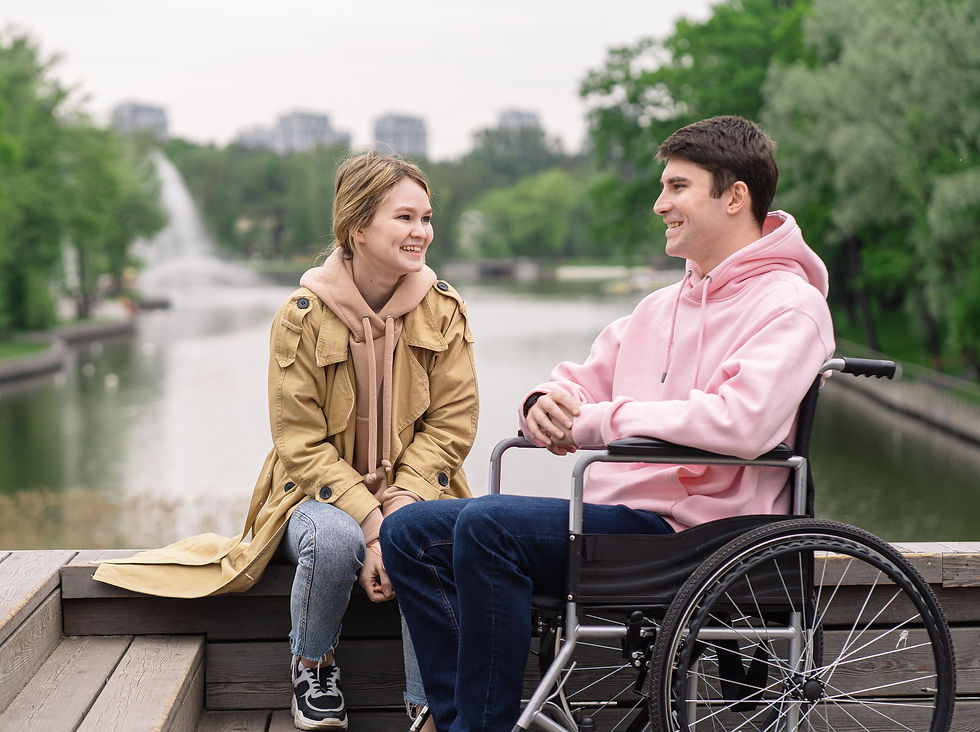Allyship 101: The Ultimate Guide to Being an Ally
- LifeCourseOnline
- Aug 8, 2023
- 3 min read
Updated: Aug 16, 2023
To be a true ally to people with disabilities, it is important to do more than just offer support. A good ally should unite, uplift the voices of others, and always educate themselves on experiences outside of their own. It is crucial to be mindful of our actions, listen to others, and respect their voices. With this in mind, anyone can work towards being an ally for disability communities by:
Being language conscience
Being action conscience
Being open to learning and teaching
You’ve already taken an important step towards being a good ally by reading this article and exploring ways to be the best ally possible!

1. Be Language Conscience
Thinking about how we speak to others in our day-to-day conversations is important to promote inclusivity. You can start by avoiding assumptions about someone's abilities, speaking directly to everyone you address, and using inclusive language.
Inclusive language means avoiding ableist language and toxic positivity. These can be hurtful or minimize someone's struggles. We can create a more inclusive and positive community by thinking about how and what we say when we talk to others.
Ableist language When you use a disability to describe something negative. Like: I’m so OCD, falls on deaf ears, etc.
Toxic Positivity When you only use positive language when someone is experiencing something difficult. Like: look on the bright side, stay positive, etc. Ignoring the challenges someone faces can feel like you are minimizing their struggles or blaming them for feeling discouraged. It's important to recognize that barriers can be difficult to overcome and it's better to acknowledge them than to ignore them
2. Be Action Conscience
To be a good ally, showing respect and avoiding assumptions about someone's needs or abilities is important. One way to do this is by asking before helping or by making spaces and in-person events accessible.
You can also be mindful of what you share on social media to prevent posting offensive or disrespectful content. An example that is widely shared is "inspiration p*rn."
“inspiration p*rn”: occurs when people with disabilities are used as inspiration for able-bodied individuals or when their skills and achievements are overshadowed by their circumstances. Watch the video by Stella Young that discusses this concept:
3. Be open to learning and teaching
If someone corrects you on your language or actions, learn and apply them. It’s important always to respect other people’s personal preferences and how they wish to be addressed or treated. We need to understand that everyone is different, so everyone’s preferences and comfort levels will be as well. To ensure that everyone is comfortable and included, we must learn to adapt to each person’s wants and needs.
However, it’s important to remember that it is your responsibility to seek out information. For example, to support a friend with a disability, you can research their disability online or ask them about it-- if it's appropriate. Doing your own research shows that you care and are willing to try to understand their experiences and perspectives. And when appropriate, share your learnings with others to spread awareness.
One easy way to learn more is by following creatives on social media. Check out our blog post: 4 influential people with disabilities you need to follow , to follow some of our favorites.
For parents, teaching inclusiveness early on is crucial. Use moments when children ask about or stare at someone with a disability to emphasize that everyone is different.
Being an ally means supporting and advocating for individuals who face inequality. To create a world where everyone is treated with dignity and respect, we can listen to the voices in the disability space, respect them, and take action. By following the guidelines in this article, you can create a more inclusive and supportive community for people with disabilities.
Join us in being an ally and supporting disability-owned and purpose-driven businesses! Follow LCO's social media to stay updated on the business of the month. Let's show our support and make a difference!
Works Cited
Diviney, H. Being an ally to people with disabilities. ABC. October 7, 2020. Retrieved from https://www.abc.net.au/everyday/being-an-ally-to-people-with-disabilities/12684064
Fernández, C. The harmful, ableist language you unknowingly use. BBC Worklife. March 30, 2021. Retrieved from https://www.bbc.com/worklife/article/20210330-the-harmful-ableist-language-you-unknowingly-use
Pulrang, A. People with Disabilities Have A Complicated Relationship With Positivity. Forbes. June 22, 2021. Retrieved from https://www.forbes.com/sites/andrewpulrang/2021/06/22/people-with-disabilities-have-a-complicated-relationship-with-positivity/?sh=20a007734a2c
Dance, A. Top 10 Disability Workplace Accommodations: How Does Your Company Measure Up?. MyDiversability.October 1, 2022. Retrieved from https://mydiversability.com/blog/2022/10/1/top-10-disability-workplace-accommodations-how-does-your-company-measure-up
Sung, Morgan. "How to be a disability ally in an inclusive world." Mashable. July 6, 2020. Retrieved from: https://mashable.com/article/disability-ally-inclusive/.
Social Diversity for Children Foundation. "10 Ways YOU can be a Disability Ally". September15. Retrieved from: https://www.socialdiversity.org/updates/00n8u4gcgi02vu7x2xgsvsbbvj6y79


